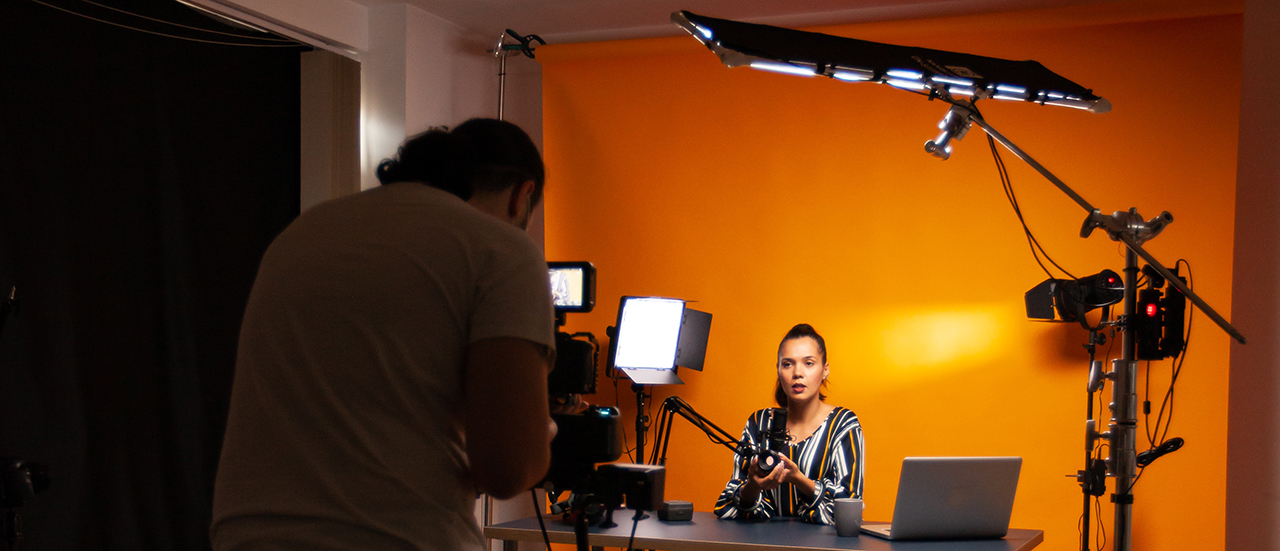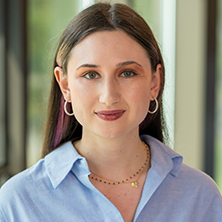
In the Lead With Jess Rauchberg
Wednesday, September 10, 2025
In the Lead With is a conversation with industry leaders on key trends and leadership challenges. In this issue, we spoke with Jess Rauchberg, assistant professor and digital media scholar, who discusses how leadership and trust function in both traditional workplaces and the creator economy.

Jess Rauchberg, Assistant Professor and Digital Media Scholar
Ruchin Kansal (RK): Jess, thank you so much for joining us for the 10th edition of In the Lead. We’re focusing this issue on trust and leadership — two themes that consistently emerge in our research on the future of work. You bring such a unique perspective to this space through your work in digital media and labor. Let’s start there — can you tell us a bit about what you do and what drives your interest in this area?
Jess Rauchberg (JR): Thank you, Ruchin, and congratulations on the 10th edition — how exciting! I'm honored to be part of it. I’m an assistant professor in the Department of Communication, Media and the Arts at Seton Hall in the College of Human Development, Culture, and Media. My research focuses on digital media and the cultural implications of these technologies — how they shape our work and how they reflect or reproduce inequalities from our offline world.
A significant part of my work involves examining the creator economy — a vast, global, multiplatform labor market comprising individuals who utilize content creation platforms to promote, publish and monetize their work. I study how traditional inequalities around labor, like race, gender and disability, often get reproduced in these digital spaces. I’m particularly interested in three key aspects: authenticity, credibility and power. How do audiences perceive influencers as “real"? Why do we turn to them for not just product recommendations but also politics and ideas about how to live?
I came to this work as both a scholar and a former content creator. I spent about two years creating educational content on Instagram that addressed disability and media representation. I was what you’d call a nano-influencer — I had a couple of thousand followers, not huge — but I learned a lot about how people perceive credibility and influence. That experience helped me realize I had a unique vantage point. I was doing this work while finishing my Ph.D. in media studies, and I thought, “What happens if I bring an academic lens to this lived experience?”
I’m interested in how leadership and trust are turned into commodities that can be bought, sold or profited from, whether by platform companies like Meta or ByteDance or by individual creators themselves.
RK: Leadership and trust can be sold as “commodities.” That is intriguing. Can you say more about that?
JR: Yes. When I say that leadership and trust are objects, I mean they can be packaged, sold and profited from. In the creator economy, being seen as a leader means having visibility and shaping people’s ideas, consumer habits and even their politics. And trust — especially credibility — is part of that brand.
As my colleague Mariah Wellman puts it, credibility becomes “the branding of trustworthiness.” You’re essentially selling the idea that “I’m someone you can trust.” That has real value, and that value is monetizable — whether it benefits a creator or the platform company behind them.
RK: Trust is monetizable. I think our readers will enjoy reflecting on that! Before we dive deeper into the creator economy, I want to go back to the traditional workplace. So many organizations are still hiring humans, but they’re also increasingly digital and saturated with social media. What can leaders in traditional organizations learn from your work?
JR: I think a lot about this when teaching undergraduates, many of whom want careers in professional industries but who are also deeply immersed in digital culture. Some want to be content creators themselves, especially as AI accelerates that possibility.
One of the ways I prepare students for this hybrid workplace is by building classes around real-world skill sets. For example, when I first joined Seton Hall in 2023, I came across a white paper from the World Economic Forum listing the top 10 skills employers will be looking for by 2027. It included things like familiarity with generative AI tools, but also soft skills: flexibility, resilience, self-starting and communication. So, I reverse-engineered my courses to build those into the curriculum.
And I emphasize understanding how industries work. It’s not enough to know how to make a podcast or video; you need to understand the structures behind them. Who profits? What’s the platform’s business model? That kind of media literacy is key for students to become leaders in these spaces.
RK: Would you say the same skills — resilience, flexibility, people skills — are essential in the creator economy?
JR: Absolutely. The creator economy is valued at around $250 billion globally. It really began in the mid-2000s with video platforms like YouTube, and it took off after the 2008 recession. A lot of young people who couldn’t find internships in industries like fashion or beauty journalism started blogging and vlogging — and advertisers noticed. They realized these creators had direct access to audiences. It was a workaround that didn’t have the same journalistic ethics constraints.
Over time, the industry professionalized, but regulation still lags. The FTC didn’t release guidelines about disclosure until 2019, and even now enforcement is minimal. So, creators have to navigate a really unstable environment. Platforms come and go. Vine is a great example; people built careers there, and when it folded, some couldn’t transition to other platforms.
So yes — resilience, adaptability and creativity are essential. You have to constantly reinvent yourself, and that’s a lot of work. Being a creator sounds fun, but it’s labor-intensive and precarious. There’s no union (yet), no benefits and limited protections.
RK: So, despite the differences, trust in both traditional and digital industries still come down to the same foundations?
JR: Yes. They may look different, but those soft skills — resilience, adaptability and communication — are what allow people to build trust and succeed. Whether you’re a creator or a corporate employee, it’s hard to thrive.
RK: What are three things anyone, whether in a traditional workplace or creative one, should do to build trust?
JR: First, be transparent. Whether you’re sharing where your information comes from or explaining how you arrived at a decision, people value clarity. A lot of successful creators show their process, behind-the-scenes content and context for their choices. It helps build that connection.
Second, diversify your skill set. Don’t stick to one niche. That’s especially true in the creator economy, where you can’t rely on just one platform. In traditional work, this might mean learning additional programming languages or understanding how digital tools intersect with your industry.
Third, be real. We are in an oversaturated market, whether it’s suntan lotion or lifestyle content, and people gravitate toward what feels consistent and relatable. That doesn’t mean you have to share everything, but the creators and professionals who succeed are the ones who feel human and genuine.
RK: That maps exactly to what trust literature says: Transparency reflects integrity, diversified skills show capability, and authenticity conveys benevolence. Now, let’s flip the lens. How do leaders, especially in creative or distributed environments, build trust with their teams?
JR: In my research, I look at influencers who lead through consistency and niche. The leaders in this space are the ones who stick to a schedule, build audience expectations, and expand their brand over time.
Take Alix Earle, for example. She started with “Get Ready with Me” college vlogs and built a huge following. Now, she partners with big brands like Dyson, has launched scholarships, and landed on Forbes’ “30 under 30” list. She didn’t stay stuck in one version of herself — she grew with her audience.
Or look at Nate the Hoof Guy, a bovine vet in Wisconsin. He has millions of followers
just by posting videos about treating hooves. He's consistent, informative and really
niche. That’s leadership, too.
These creators aren’t just influencers, they’re entrepreneurs. They build trust by
showing up and being themselves over and over again.
RK: You’re reframing leadership as influence and trust as credibility. And once that’s established, can it be monetized?
JR: Exactly. Once you’ve branded yourself as trustworthy, that becomes your value. Brands want creators who already have that audience’s trust. The more credible you are, the bigger your opportunities.
And it’s not just about products. Mormon women, for example, are huge in the lifestyle influencer space. Part of that is cultural — documenting family life is seen as part of their religious mission. But it's also savvy. They’ve become trusted voices in fashion, home and parenting — and brands notice.
RK: So your identity becomes your brand. The more authentic and credible it is, the more valuable it becomes.
JR: Yes. But that also comes with responsibility. If you brand yourself as inclusive or body-positive and then do something that contradicts that, without transparency, it can break the trust. I recently wrote an op-ed about a plus-size fashion influencer who got weight loss surgery and didn’t disclose it to her followers for two years. The backlash wasn’t about the surgery — it was about the lack of honesty.
RK: So, if there’s one takeaway for building trust and leading in today’s world, what would it be?
JR: Be honest. That’s the key. You don’t have to share everything, but don’t mislead. In such an oversaturated market, honesty is what makes you stand out and helps you lead in whatever space you’re in.
RK: Thank you, Jess. This was truly insightful. You’ve shown how, even in an evolving economy, the principles of leadership and trust remain deeply human.
JR: Thank you, Ruchin. I’ve really enjoyed the conversation.
In the Lead magazine is a collaboration between the Buccino Leadership Institute and the Stillman School of Business’s Department of Management. This edition reaffirms Seton Hall’s commitment to fostering innovative, ethical and impactful leadership. Stay ahead of the curve — explore the Fall 2025 issue of In the Lead.
Categories: Business

